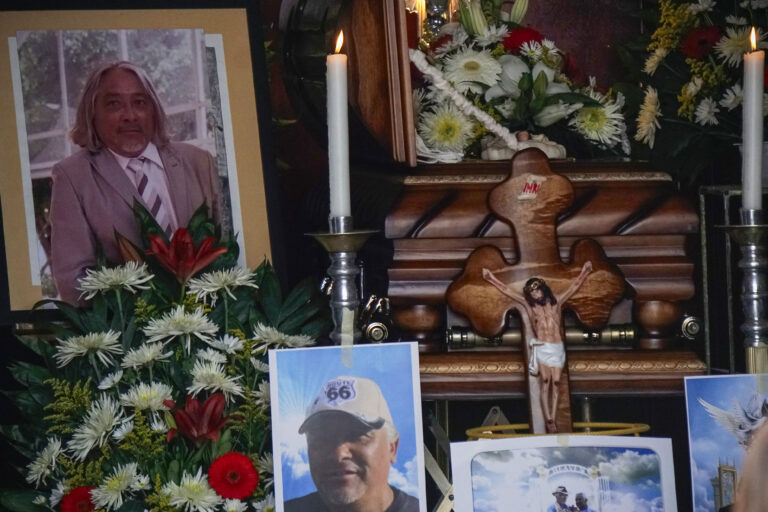(IAPA/IFEX) – The following is a 28 February 2001 IAPA press release: DEEP SATISFACTION OF THE INTER AMERICAN PRESS ASSOCIATION AT PLEDGE BY PRESIDENT FOX NOT TO REGULATE PRESS ACTIVITIES The Inter American Press Association calls for crimes against journalists to be considered violations of federal law, for legislation to give all Mexicans access to […]
(IAPA/IFEX) – The following is a 28 February 2001 IAPA press release:
DEEP SATISFACTION OF THE INTER AMERICAN PRESS ASSOCIATION AT PLEDGE BY PRESIDENT FOX NOT TO REGULATE PRESS ACTIVITIES
The Inter American Press Association calls for crimes against journalists to be considered violations of federal law, for legislation to give all Mexicans access to public information and for the repeal of the press law
MEXICO CITY (Feb. 28, 2001) -The Inter American Press Association (IAPA) today warmly welcomed a statement by Mexican President Vicente Fox that “the state should not meddle” in activities of the press. He was speaking to a group of senior officers of the hemispheric organization.
“I am fully convinced of the need for there to be total transparency and broad freedom of the press without any kind of regulation or intervention on the part of the state,” Fox said during a working breakfast, which he hosted for an IAPA international delegation, headed by its president, Danilo Arbilla.
Welcoming Fox’s stance, Arbilla, editor of the Montevideo, Uruguay, news weekly Búsqueda, said that “we applaud his philosophy in respect to freedom of the press, that there should be no regulation to limit it, and that there be the least intervention possible on the part of the state.” Arbilla stressed that it was IAPA’s belief that “the best press law is no press law.”
After hearing IAPA’s concerns about press freedom in Mexico, Fox explained that “the process of media development was very slow in the 20th century” in his country. There had been a press that did not always reflect the feelings of the ordinary citizen, he said, but this had begun to change under the previous administration of President Ernesto Zedillo.
“This has now changed,” he declared, “and now we are committed to full freedom of expression, an unswerving conviction and an obligation within our new democratic culture that we are constructing.”
On behalf of the more than 20 media heads from throughout the Americas attending the two-hour meeting, Arbilla called for three specific points from the Mexican government: greater attention to the number of crimes against journalists and violence against the media which remain unpunished, guarantees for the government to enact legislation providing for access to public information by all the people, and repeal of the restrictive 1917 press law.
In this regard, the IAPA called upon President Fox to view the murder of journalists as a crime punishable under federal law and, in specific cases, to implement recommendations of the Inter-American Commission on Human Rights in the murders investigated by the IAPA of Victor Manuel Oropeza, killed by the Amado Carrillo Cartel or Juarez Cartel, and of Hector Felix Miranda, also slain by drug traffickers. The recommendations call for new investigations – in addition to those carried out four years ago at the insistence of the IAPA – and for the guilty to be bought to justice and the victims’ families to receive compensation.
The IAPA also handed Fox documentation concerning some 20 still unpunished cases of journalists murdered in the last 15 years.
Arbilla expressed IAPA’s deep concern that the proposed repeal of the press law has given rise to numerous counter-actions by a number of legislators from different political parties, who believe that the repeal should result in new press laws. Fox acknowledged the existence of such actions, but reiterated his position that the state “should not get involved” or regulate in this matter.
The Mexican president said his government was collecting information and ideas about other Latin American proposed legislation dealing with access to public information, so as to enable Mexico to come up with a good law, in accordance with “the institutionalization of our obligation for transparency” in governance.
He called on Government Minister Santiago Creel to maintain a direct and open channel of communication with the IAPA in order to have an exchange of information concerning the murders of journalists and the other matters discussed at the working meeting.
He said his administration would closely follow the recommendations that might emerge from a Forum on Freedom of Expression that the IAPA was holding later today with a group of Mexican newspaper publishers, with the participation of academics, legislators and journalists.
In addition to Arbilla, the IAPA delegation was made up of Rafael Molina, chairman of the Committee on Freedom of the Press and Information, Ahora, Santo Domingo, Dominican Republic; Horacio Aguirre, former president of the IAPA, Diario Las Americas, Miami, Florida; Tony Pederson, former president of the IAPA, Houston Chronicle, Houston, Texas; Romulo O’Farrill, former president of the IAPA, Novedades, Mexico City; Andres Garcia Lavin, former president of the IAPA, Novedades de Merida, Yucatan, Mexico; Andres Garcia Gamboa, IAPA 2nd vice president, Novedades de Quintana Roo, Cancun, Mexico; Gonzalo Leaño, member of the IAPA Board of Directors, Ocho Columnas, Guadalajara, Mexico; Edward Seaton, former president of the IAPA, Seaton Newspapers, Manhattan, Kansas; Enrique Gomez Orozco, member of the IAPA Board of Directors, a.m., Leon, Mexico; Juan Ealy Ortiz, regional vice chairman for Mexico of the Committee on Freedom of the Press and Information, El Universal, Mexico City, Mexico; Jose Santiago Healy, member of the IAPA Board of Directors, El Imparcial, Hermosillo, Mexico; Alejandro Miro Quesada C., chairman of the Chapultepec Committee, El Comercio, Lima, Peru; Bartolome Mitre, member of the IAPA Board of Directors, La Nacion, Buenos Aires, Argentina; Hector Davalos, member of the IAPA Board of Directors, Novedades de Acapulco, Acapulco, Mexico; Alberto Schazin, La Nacion, Buenos Aires, Argentina; Roberto Rock, El Universal, Mexico City; Julio E. Muñoz, executive director of the IAPA, and Ricardo Trotti, Press Freedom Coordinator.
For further information,


